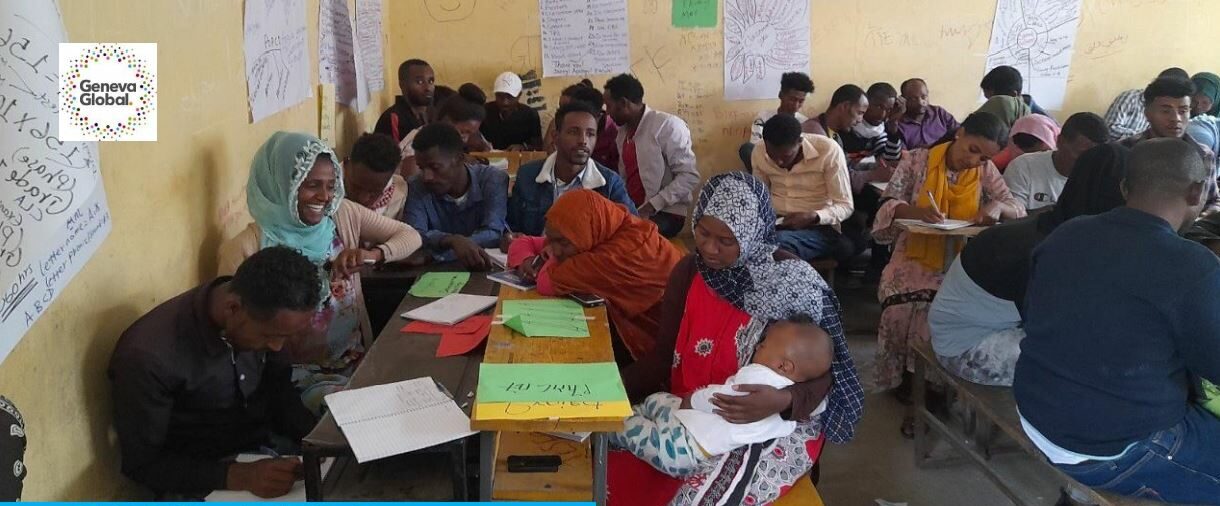This website uses cookies so that we can provide you with the best user experience possible. Cookie information is stored in your browser and performs functions such as recognising you when you return to our website and helping our team to understand which sections of the website you find most interesting and useful.
Geneva Global is part of Global Impact Ventures

Education Inititives > education articles
Oromia REB Opens 106 Speed Schools in Wake of Violence on Border with Tigray
“You came to us, you gave us the window of opportunity to see hope again and, more importantly, to meet our students who are the source our happiness.”
The intense violence that occurred in Ethiopia’s Amhara region with the Tigray conflict that began in November 2020 resulted in a disruption or total suspension of learning that still lingers. Practically, the violence caused the total or partial destruction of nearly 4,100 schools in the region’s northern zones, closing classes for around 1.8 million students. With the return of calm to the area at the end of 2021, the region began thinking about the bringing these students back to formal learning. Towards this end, the Amhara Regional Education Bureau turned to Geneva Global to support this effort in North Wollo Zone, recognizing the Speed School model as best suited to “jump-start” learning there. In April 2022, the Amhara Region committed to opening 106 Speed Schools to return 4,000 conflict-affected children to school. From April 16 to 18, Geneva Global Ethiopia and the Amhara Development Association joined with the Amhara Regional Education Bureau (REB) to train 129 Accelerated Learning Program teachers, 23 school principals, and four Woreda level education agents. Such trainings usually occur in August and September, just before schools open for the new academic year. While excited to return to the classroom with their students, teachers faced more than the challenge of learning the Speed School model and methods. The training team reported that they had never encountered a group of teachers so extremely affected by personal trauma. Many had lost immediate family members and other loved ones to the conflict. Several had endured their own wounds, whether physical, psychological, or both. The trainers listened to the teachers as they shared their heartache and stories, sometimes crying with them and joining in mourning for their communities. When the teachers were ready, the training could resume. The Speed School’s collaborative and integrative approach to education and engagement has proven to have a healing effect on both the teachers and their students. The mere fact of returning to the routine of formal education has helped both to return to a state of calm. Ayene Amare, a primary school principal who took part in the training remarked that, “After the conflict, I was lonely. Being lonely for a teacher and principal like me was depressing; it was an unbelievable time of my life. I felt that I was forgotten. Geneva Global’s support is a healer for me and my colleagues.” More substantively, the Activity Based Learning (ABL) methodology permits teachers and students to confront different aspects of their stress in a safe and reflective way, offering an opportunity to interact with others and positively process their emotions. Teachers especially appreciated the think-pair-share method and art-based learning as ways to express their emotions with each other and saw for themselves the positive impact these strategies would have on their students. Following the teacher training, the REB opened the 106 Speed School classrooms, enabling 4,003 conflict-affected children to engage in learning and re-commit, with their parents, to their futures. Their learning with Speed School extends beyond just knowledge transfer to ensure that they are also equipped with practical skills. They learn to debate and negotiate while also learning respect and honesty, skills essential to harmonious learning and conflict resolution. Teachers use play-based activities and music to monitor the students’ educational progress and mental wellbeing. Attending school has brought the normalcy and consistency that the children needed, and teachers have observed a renewed passion for learning by their students. This commitment to learning has grown further with the quality and relevance of the lessons. Perhaps most indicative of this is the fact that absenteeism has declined significantly while enrollment has increased. In a class of 40 students, attendance had previously averaged a mere five to ten students. With the launch of the Speed School classes, the average is now 35 students. The excited students return home and share their enthusiasm for learning with their friends, who now also want to join the Speed School classes. Beyond the classroom, the Speed School trained teachers are now seen as model members within the community. Fearful of another conflict, the teachers provide the community with a degree of hope and support, able to convey through their students and directly both the day-to-day and the future in a positive way. The teachers take care always to speak positively with the community and their colleagues. The Speed School model has changed lives in North Wollo. Tiruye Sahilu, a primary school teacher expressed that, “You [came] to us, you gave us the window of opportunity to see hope again and, more importantly, to meet our students who are the source our happiness.” Both teachers and students have returned to the classroom. The Speed School training allowed teachers to process their grief and trauma in a healthy way while preparing them to educate students facing the same or similar traumas. The students are learning essential skills and preparing for fruitful futures. Now is a critical time for the region. There are still two million out-of-school children from the recent conflict. Scaling up the Speed School model seems to offer a highly promising strategy to address this imperative. The REB seems ready and eager to proceed. Now it just needs the necessary resources.
